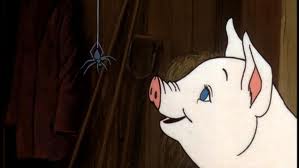Charlotte’s Web (1973)

Charlotte’s Web follows the story of an extraordinary pig called Wilbur, the runt of the litter, who is saved by the farmer’s daughter, Fern, before her father has a chance to end its life. Eventually Fern and Wilbur win the heart of her father and she is allowed to keep Wilbur as a pet, but is to be kept in the stables with the other animals. The time comes when Wilbur is old enough to be ‘sent away’, a compassionate spider, Charlotte, steps in to save the pigs life by humanising him by weaving positive words into her web and into the minds of the town-folk.
I think interpreting this movie in such a way could elicit some heated discussions about what it means to have moral obligations towards animals and how (or if) it can be justified. Animal ethics and philosophy can be grouped into three general categories: indirect theories, direct but unequal theories, and moral equality theories (Wilson, 2001).
Indirect theories state that animals should not have any moral status as they lack human qualities such as the ability to reason or to feel empathy and compassion. Aristotle (284-322 BC) concluded that animals could be used without the consideration we give to people, as did Descartes (1596-1650) (Isacat, 2008). But because they do not have these characteristics, does it mean that our moral or ethical duty toward animals should consciously see us mistreating them, causing them harm directly or indirectly? Regan, a 21st century philosopher, points out that human beings often lack some of these qualities such as infants (unable to think or reason logically) and people who have severe mental impairments through sickness, illness or disease (inability to think logically or rationally). So where does that leave animals and humans?
Arne Naess (1973) coined the terms ‘Deep Ecology’ and ‘Shallow Ecology’ in regards to all living things on this earth (Isacat, 2008). The first and second tenet of shallow ecology is that all creatures on Earth have value only for their usefulness to humans, and complex creatures (ie humans) are more important that simpler ones. In this particular film, Wilbur is seen to be only useful in two ways: in the middle of the film, the farmer is only keeping him around to use as food; and toward the end of the film, Wilbur is providing the farmer with status amongst the community.
Direct but unequal theories argue that because most animals experience emotions such as fear, happiness, contentment, pain, and depression just as humans do, then they deserve to have moral status. The writers and producers have obviously given human qualities to these animals in order to make the movie identifiable with viewers (otherwise it would be a non-fiction documentary). According to Fern, Wilbur’s intrinsic qualities (the first tenet of deep ecology) far outweigh the pigs worth to humans as a source of food.
Moral equality theories categorise animals and humans to have the same full and equal moral status. If we were to regard animals with the same moral status as human beings, where do we stand in regards to farming and consumer practices?
References
Isacat, B. (2008). How to Do Animal Rights: Legally, with confidence (2nd e.d.). Retrieved from http://www.animalethics.org.uk
White, E. B. (Novel), Nichols, C., & Takamoto, I. (Directors). Charlotte’s Web [DVD]. United States of America: Hanna-Barbera Productions and Paramount Pictures
Wilson, S. D. (2001). Animals and Ethics. Retrieved from http://www.iep.utm.edu/anim-eth/





